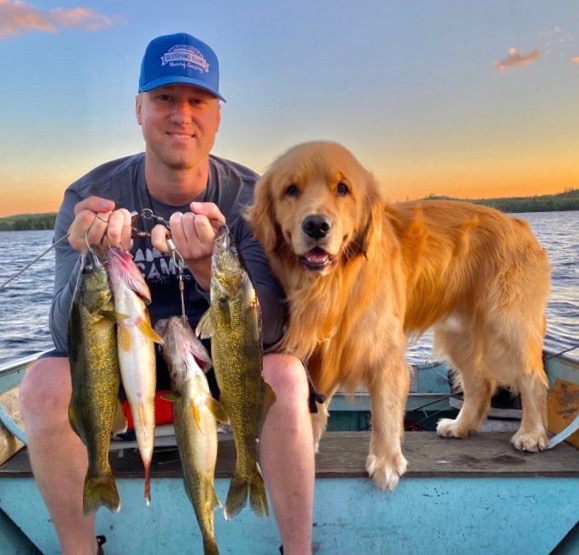Living off the Land
Published Monday, May 3, 2021

To relax, Peter Hayes (Clinical Nurse Specialist, Emergency Department) and his sidekick Teddy like to go fishing. Regardless of the season, fishing allows for a time to escape the busy responsibilities of life, get out in nature and appreciate what peace it has to offer. Fishing forces you to slow your life down, get away from social media, reflect on what’s important in life, and maybe even be rewarded with a fish.
Living off the Land
By Samantha Morris, Prevention and Screening Clinical Services
Your grandma was right when she told you to ‘take the time to stop and smell the roses.’ Interacting with the natural environment can promote health and well-being. Dating back to the days of our ancestors, hunters and gatherers relied on the basics such as food, water, and shelter for survival. Humans instinctually lived off the plants and animals that inhabited their environment. This has been and continues to be an important part of how modern humans experience the environment.
As we look forward into the future, it is important to recognize the benefits of sustaining our environment. Eating and living more sustainably can help reduce our impact on the world’s resources. Although activities like gardening, fishing, and hunting may take hard work and skill, they also promote relaxation, patience, and balance. Sustainably sourcing our own food can also be more affordable and bring us closer to the beauty of nature.
Here are some tips to help you live off the land:
Fishing:
- Fish throughout the year. Fishing isn’t just a summer sport; you can fish year-round! Challenge yourself to try a different type of fishing. The options are endless and you don’t need to go far: https://www.northernontario.travel/fishing/top-reasons-to-fish-thunder-bay-ontario. Be sure to check local fishing regulations for open seasons and limits.
- Fish for your health. Fishing provides both mental and physical benefits. Not only is fishing meditative, but eating your catch of the day is a great source of omega-3 fatty acids which may reduce your risk of heart disease and stroke.
Gardening:
- Water matters. When it comes to watering your garden, use a rain barrel instead of tapping into the nearest faucet. Rain water is highly oxygenated and better for plants and soil with no additional chemicals.
- Know your planting region. The growing season tends to be short in Northwestern Ontario. Do your research before you start and develop a schedule for planting and harvesting: not all foods will grow in this climate, so choose appropriately.
Hunting:
- Know your game. Whether you are looking for game that is big or small, understanding the different terrains can make all the difference. Plan when and where you want to hunt: https://www.northernontario.travel/hunting/northwestern-ontario-hunting-big-and-small-game.
- Game is lean and mean. There are many health benefits associated with eating game. Game meat is lean; it is low in fat, cholesterol and high in iron and omega-3 fatty acids. It also has a lower carbon footprint, indicating a more sustainable food source. Try filling your freezer this year for the health of the environment and most importantly, you!
By taking the time to stop and smell the roses and connect with nature, we can engage in positive behaviours and most importantly, become a healthier, more sustainable community.